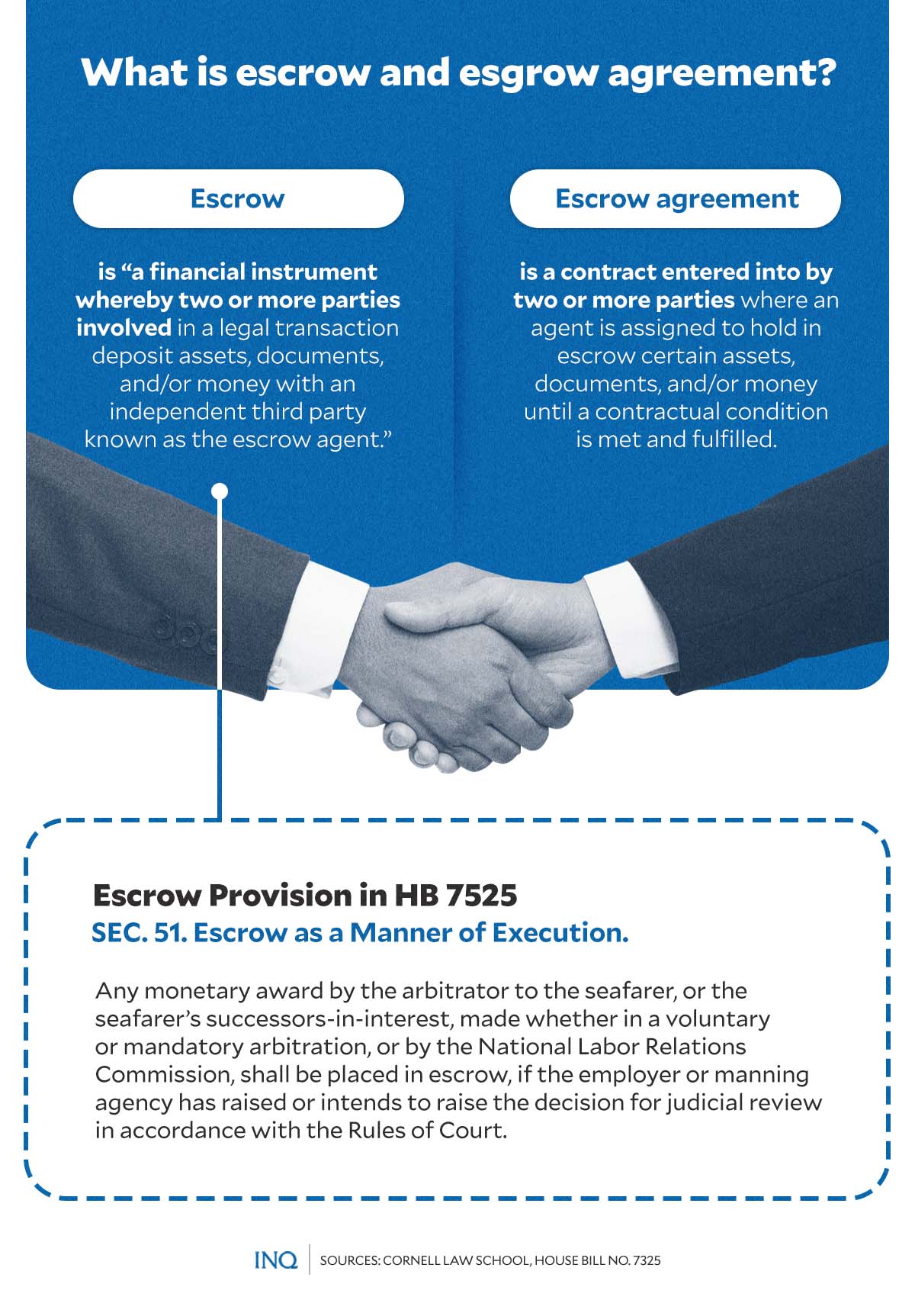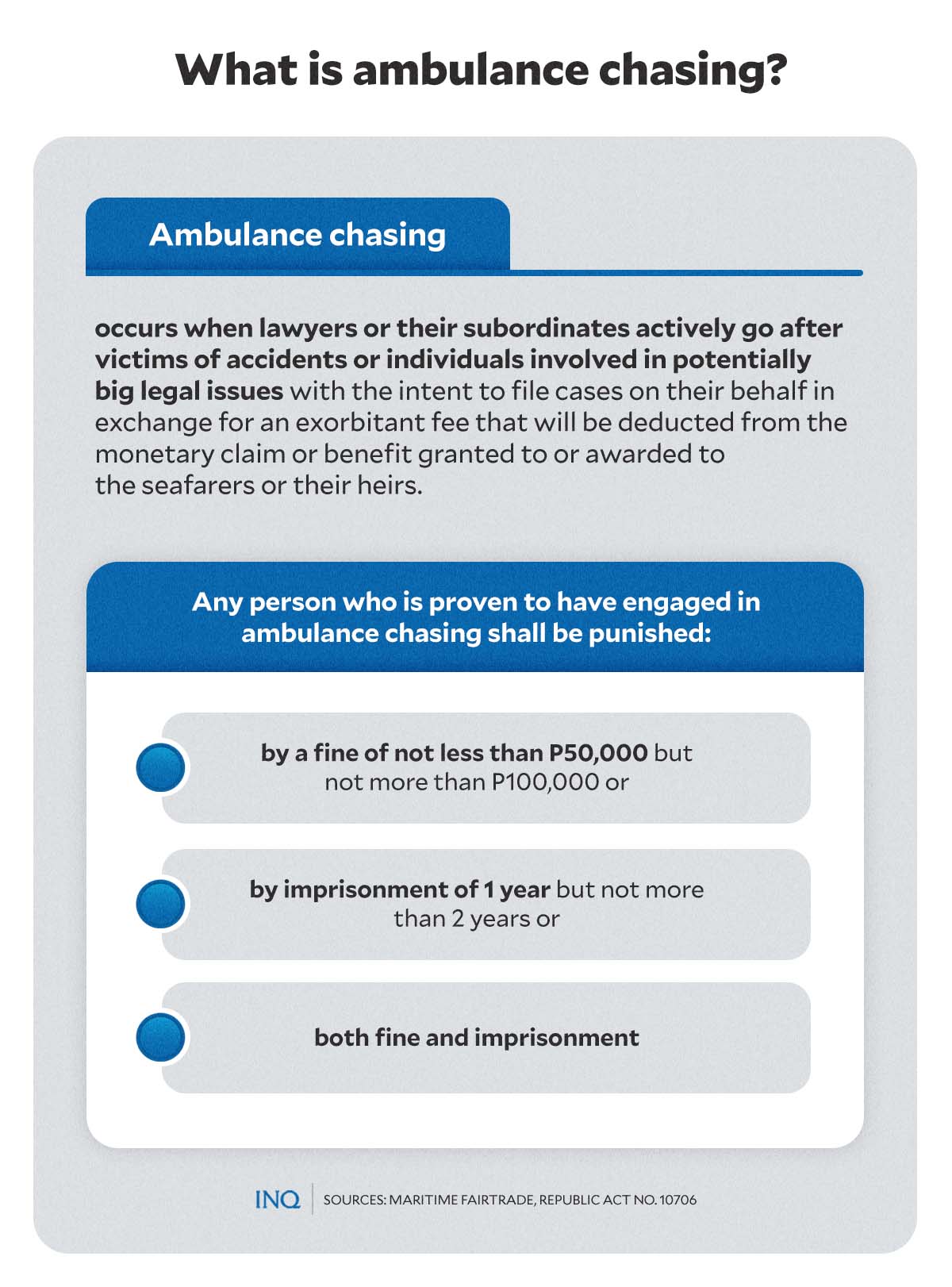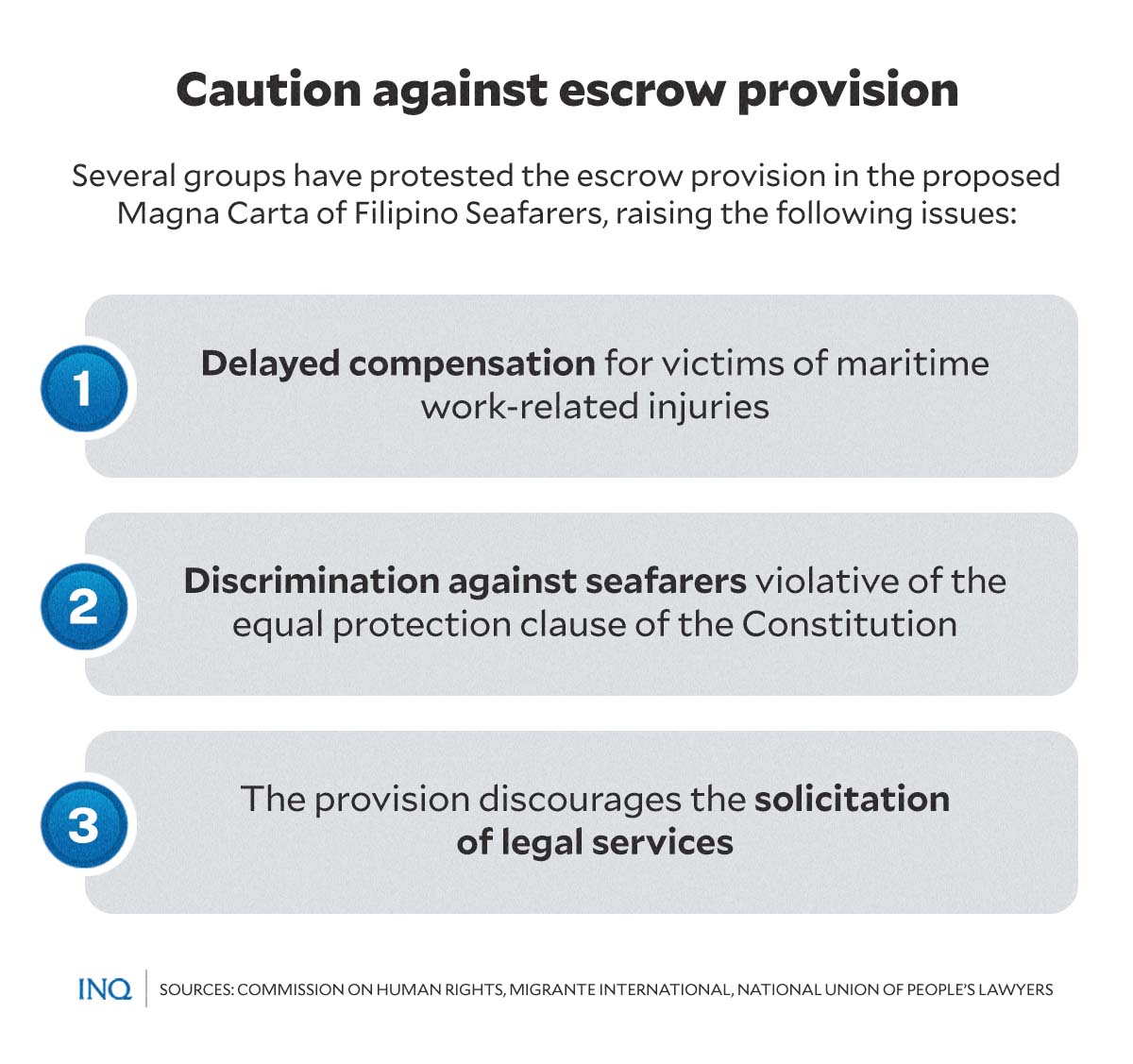You are here
Escrow: Fly in the ointment in proposed Magna Carta for seafarers
Escrow: Fly in the ointment in proposed Magna Carta for seafarers
May 18, 2023 https://newsinfo.inquirer.net/1770948/escrow-fly-in-the-ointment-in-prop...
MANILA, Philippines—While the recently approved draft of the Magna Carta of Seafarers was seen as “a much-needed development” in advancing and protecting the rights of Filipino seafarers, groups cautioned against a provision in the proposed measure.
Last March, House Bill (HB) No. 7325 or the proposed Magna Carta of Filipino Seafarers—which seeks to provide Filipino seafarers full protection before, during, and after employment—was approved by the House of Representatives on third and final reading with 304 affirmative votes.
The measure outlines the rights and welfare of seafarers, like the right to educational advancement and training at an affordable cost; right to public consultation in discussions about their jobs; the right against discrimination; the right to free legal representation; and the right to an appropriate grievance mechanism.
READ: House approves Magna Carta for Seafarers proposal on third reading
In a statement, the Commission on Human Rights (CHR) welcomed the approval of the measure, highlighting the Magna Carta’s strengthening of seafarers’ rights and its thrust to improve their employment rate and competitiveness in the global market.
“This Magna Carta also strengthens women’s meaningful participation in the maritime industry, placing measures to promote equal opportunities, fair treatment, and protection from gender-based discrimination,” CHR said in a previous statement.
“Further, the bill promotes accountability as it details the responsibilities of recruitment agencies, ship owners, maritime education institutions, licensing and certification bodies, and government agencies; and provides protocols for the settlement of dispute; all of which will be monitored by a Congressional Oversight Committee,” it added.
However, the CHR, along with other groups and organizations, have expressed concern against the “escrow provision,” which can be found in Sec. 51 of the proposed Magna Carta—which might further burden Filipino seafarers.
Understanding escrow agreement
According to Cornell Law School, an escrow is “a financial instrument whereby two or more parties involved in a legal transaction deposit assets, documents, and/or money with an independent third party known as the escrow agent.”
An escrow agreement refers to a contract entered by two or more parties where an agent is assigned to hold in escrow certain assets, documents, and/or money until a contractual condition is met and fulfilled.
In the proposed Magna Carta of Filipino Seafarers, Section 51—“Escrow as a Manner of Execution”—states that:
“Any monetary award by the arbitrator to the seafarer, or the seafarer’s successors-in-interest, made whether in a voluntary or mandatory arbitration, or by the National Labor Relations Commission, shall be placed in escrow if the employer or manning agency has raised or intends to raise the decision for judicial review in accordance with the Rules of Court. The amount in escrow shall not include the claims for salaries, statutory monetary benefits, or those originally determined by the employer or manning agency to be legally due to the seafarer.
The amount shall remain in escrow until the issuance of an entry of judgment by the appropriate reviewing court or when the employer or manning agency fails to perfect the appeal or petition for review. The fees in obtaining or maintaining the escrow account shall be paid by the employer or the manning agency.
The interest earned by the amount in escrow shall inure to the benefit of the prevailing party.”
If the proposed Magna Carta becomes law, the Department of Migrant Workers (DMW) will be tasked with issuing the implementing guidelines for this section.
As explained by CHR, this means that a third party will hold any contested funds for compensation involving work-related injuries or the amount will not be released to the seafarer or their heirs “until all litigation processes and corresponding appeals to higher courts have been completed.”
The overseas Filipino workers (OFW) group Migrante International explained that under the escrow provision, “money awards won by seafarers in the National Labor Relations Commission (NLRC) or the National Conciliation and Mediation Board (NCMB) will not be released to them in full. Instead, the money will be deposited in escrow, the amount of which shall be determined solely by the employer, manning agency, and shipowner.”
The money will be released only after the Court of Appeals and the Supreme Court finally decide that the money should be given to the seafarer.
Alleged purpose of the provision
Proponents of the escrow provision in the House bill clarified that it would protect seafarers from the practices of ambulance chasers.
According to Republic Act (RA) No. 10706, or the Seafarers Protection Act, ambulance chasing occurs when lawyers or their subordinates actively go after victims of accidents or individuals involved in potentially big legal issues with the intent to file cases on their behalf.
Exorbitant fees will then be deducted from the monetary claim or benefit granted to or awarded to the seafarers or their heirs.
Ambulance chasing is unlawful, and anyone who is proven to have engaged in ambulance chasing shall be punished:
by a fine of not less than P50,000 but not more than P100,000; or
by imprisonment of 1 year but not more than 2 years; or
both fine and imprisonment.
In 2018, a father-and-son team of lawyers faced a two-year suspension for ambulance chasing and failing to account for the monetary award of a seafarer who sued his employers due to serious work-related injuries.
The seafarer won $95,000 in a settlement, but the Filipino lawyers gave him only around $20,000 after deducting a 35 percent share, in addition to the separate share of lawyers in Singapore—where the case was filed.
The Philippine Supreme Court ruled in favor of the seafarer and found that the lawyers conducted malpractice and had violated several provisions of the Code of Professional Responsibility for lawyers.
Longer years, added burden
Still, the CHR noted that the issue about ambulance chasers “or suspicious legal service solicitors that exploit accident victims to seek a sizeable cut of their compensation and benefits” should not create a process that further delays the compensation for seafarers who suffer from maritime work-related injuries.
In a statement, the National Union of People’s Lawyers (NUPL) said the inclusion of the escrow provision runs counter to the law’s objective to protect and promote the rights of Filipino seafarers.
“How can this nefariously anti-labor insertion be included in a Magna Carta for Seafarers which is supposed to protect the rights of seafarers?” NUPL said.
“Instead of releasing the award to the winning seafarer or to their heirs if they die while the case is pending, it will be deposited in escrow in a bank and will be released only when the Court of Appeals has affirmed the NLRC decision and the Supreme Court has affirmed the decision of the Court of Appeals later on,” it said.
“Aanhin pa ang damo kung patay na ang kabayo? (What will we do with the grass if the horse is dead?) As the saying goes,” the group said.
According to NUPL, the escrow provision will add more years to the already tedious and long-winding process of filing for compensation for a work-related injury and the actual awarding of the contested funds to the affected seafarers and their families.
In a separate statement, Migrante, an alliance of overseas Filipino organizations, detailed that cases in the NLRC and NCMB last for around one to two years.
Only after that period will the deposited money in escrow be released and awarded to the seafarers.
“Under this escrow provision, seafarers will have to wait for so many years for the Court of Appeals and later on the Supreme Court to review the case,” the group said, stressing that the provision would add at least four to six years for seafarers to wait—“if they can still wait for justice to be served.”
“HB 7325 is an addition to the burdens shouldered by Filipino migrants and the Filipino people. Filipino migrants are already burdened with various state exactions in the form of mandatory fees, and HB 7325, instead of advancing seafarers’ rights, is reducing the basic rights of seafarers,” the group added.
Discrimination, threat
Both CHR and NUPL believe that the escrow provision is violative of the equal protection clause of the Constitution, which stated that “no person shall be deprived of life, liberty, or property without due process of law, nor shall any person be denied the equal protection of the laws.”
“The constitutional right of equal protection shall mean that all persons or things similarly situated should be treated alike, both as to rights conferred and responsibilities imposed. Seafarers are also laborers who are entitled to the equal protection of the labor laws of the country,” said CHR.
“It singles out seafarers and excludes them from the class of employees who can get the immediate payment of their awards after winning the case at the NLRC with finality. If the seafarer wants the immediate payment of their award at the NLRC, they should pay a bond,” it added.
NUPL noted that it discriminates against seafarers and poses a threat not only to seafarers but to all OFWs and local workers.
“If they can violate the Labor Code of the Philippines this time by imposing an escrow against seafarers, what would prevent the manning agencies and the local businesses to impose this escrow on all OFWs and all Filipino workers here and abroad?” the group said.
TSB

